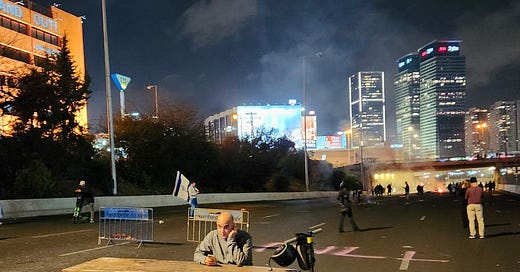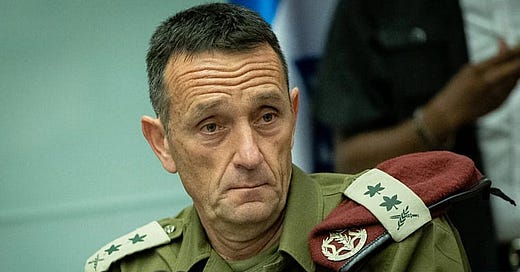

Discover more from Israel from the Inside with Daniel Gordis
Sieges in the Land of Israel are nothing new; what's changed is how they end
The Jewish state's countercultural rejection of the valorization of victimhood

This time it’s Islamic Jihad, not Hamas.1 Still, though, it could feel like the “same old.” Once again, Israel went to war in Gaza. Once again, someone fired, the other side returned the fire, civilians on both sides lived in terror. Does the pattern ever change? Some of those civilians die, terrorist cells are smashed, the firing stops and soon enough, all is quiet on the southwestern front.
Except that it was not really the “same old.” Because this time, Israel fired first. After days of compelling its citizens in Gaza-adjacent communities to stay inside their homes, after days of highway closures, trains not running, life entirely on hold because terrorists were upset that Israel had arrested one of their leaders in Jenin and threatened to rain missiles down on Israel, Israel took the first step.
It was time to end the siege on citizens in the south that was prompted by an arrest in the north.
“Siege,” interestingly, has been very much on the minds of traditional Jews for the past three weeks. And, I would argue, one cannot understand the enormous significance of Israel’s having struck first this week without a sense of Jewish history and what happened thousands of years ago.
For millennia, Jews have taught their history, one generation to the next, largely through their calendar. For the past three weeks, the period between the 17th of Tammuz and the 9th of Av, traditional Jews have been in a period of muted mourning that grew more intense with the beginning of the month of Av and which culminated yesterday with the observance of the Ninth of Av.
The “Three Weeks” begin on the date that, as tradition has it, Jerusalem’s walls were first breached after months of siege (in 586 BCE by the Babylonians with the First Temple and in 70 CE by the Romans with the Second), and they culminate with the 9th of Av, when the invaders reached the Temple (each time) and burned it.
Those ancient sieges spelled disaster for the Jewish people. The destruction of the First Temple led almost immediately to a massive exile of the Jews from the Land of Israel. Never again, since that exile, has a plurality of the Jewish people lived in the Land of Israel (though in about five yeas, that will no longer be true). The first exile brought much of biblical Judaism to an end (the identities of the tribes, for example, were forever erased). The second destruction ended biblical Jewish life for eternity.
There are those who ask, quite understandably, why we still mourn on the Ninth of Av, given that Jerusalem is rebuilt. Some respond, also understandably, that the Temple is not rebuilt, and that is why we mourn. For those not anxious to see the Temple rebuilt for an array of possible reasons, though, that answer rings hollow.
So why Tisha B’Av? It is part of the pageant called Jewish life that keeps history very much alive. It is also, among other things, at least to me, a reminder that the sieges never end. That the threat of destruction never disappears. That Jewish life in the Jews’ ancestral homeland requires vigilance, courage, determination—or it vanishes in flames. It is a reminder that though much has changed, much has not. Two thousand years later, Jerusalem is still under threat. Two thousand years later, Israel is often besieged. Two thousand years later, enemies promise our imminent demise.
The Three Weeks and Tisha B’Av serve, at least for me, as a reminder that these travails of Israeli life are nothing new. And they are a warning—that matters do not always turn out well. And they are also a reminder— of what Jewish sovereignty has done to alter the course of Jewish history.
These Three Weeks are therefore, for me, a reminder of Israel’s fundamental purpose. There were many reasons that the Jews got into the state-making business of course, but key among them was the rejection of Jewish victimhood. We would not fall again to the Babylonians. We would not fall to the Greeks. Or the Romans. Or whatever venomous hatred Europe and the West would cook up next.
Those days were gone. Jewish victimhood would be replaced by Jewish triumph—and we would not be ashamed to not have died.
That rejection of defeat and embrace of flourishing, though, does not wash in today’s culture of reverence for victimhood. In a world in which people view life only through the prisms of power versus weakness, and white versus brown, Israel (which is more brown than white, but what do facts really matter anymore?) knows what the reaction will be abroad, even among Jews.
(If you have not seen If Not Now’s use of Nazi imagery to criticize AIPAC, check it out —but be forewarned, it’s painful to view.)
These are just the most obvious examples; were it not for the need for some illustration of the sentiments mentioned above, there would be no reason to even take notice. For what would constitute moral Jewish action in the eyes of today’s worshippers of victimhood? Likely nothing less than Jews being tossed over the walls as Francesco Hayez imaged the scene (see image at the top). Because then the Jews would be victims—and thus noble.
Had they even a smidgeon of self-awareness and curiosity, though, here is the question that the worshippers of victimhood might ask themselves. Why is it that Israeli progressives are not protesting the IDF’s actions? Why are left wing Israeli political parties even supporting the fighting? Are Israeli leftists not genuine leftists? Are Israeli progressives not true progressives?
Israel has a long history of protests against military action. Think Kafr Qassem. Think Lebanon. Think Sabra and Shatila. And think massive protests against military failure as well, after the colossal mistakes of the Yom Kippur War.
If protests are so much a part of Israeli life, why the wall-to-wall agreement in Israel (except, as expected and even understandably, from the Arab parties). Because at moments like this, Israelis tend to put politics aside. Bezalel Smotrich, on the radical right, explicitly supported not just the troops, but even Yair Lapid, too, saying he had Lapid’s back and the PM should do whatever it takes. (Note that the first tweet above, which suggests that the fighting is an election ploy, is utterly unaware of how united Israeli society is at the moment.)
And what about the left? What about Israel’s true liberals and progressives?
Why did Meirav Michaeli (leader of (what’s left of) Labor) say
The residents of Israel deserve to live with security. No sovereign country would agree to its citizens living under the siege of a terror organization. The roots and implications of Islamic Jihad terror are a region-wide and international matter, and the Jihad needs to know that all its operations, everywhere including outside of Gaza, are an explicit target if they act against us. I send wishes of strength to the security forces.
Why did Zahava Gal’on, now running to head Meretz, the (often radical) left-most Jewish party, say, “What we need now is hope and security, not escalation,” which was obviously not a critique of the operation (and which may well have been directed at Hamas, which had not entered the fighting)?
They spoke this way not because they are not genuine liberals or progressives, for they are. They spoke that way because they are also fond of staying alive. They don’t have the luxury of valorizing victimhood, because it is their children who might be the victims. They don’t have the option of sanctifying weakness, because they know that the minute that they are weak, they could also be dead.
Even Israelis on the left do not believe that military action against terrorists (and yes, tragically, civilians intentionally made vulnerable by the terrorists) to keep your children safe is illegitimate.
Because Israelis, even on the left, take Islamic Jihad’s warnings seriously. As a friend of mine commonly says to me, quoting his father who survived Auschwitz, “If you’re a Jew and your enemy threatens to kill you, believe him.”
Because Israelis, even on the left, are not embarrassed that they are citizens of a country that is perhaps the greatest story of human triumph in history.
Because they are not ashamed to be citizens of a country that brought Jewish life back from the precipice, and is determined to fashion a new way of being Jewish in history.
History. In the end, it all comes down to history—knowing where we’ve come from, what we have endured, and what a dramatic change Jewish sovereignty has wrought.
In his novel, Humboldt’s Gift, for which he won the 1976 Pulitzer and Nobel Prizes, Saul Bellow tells the story of Von Humboldt Fleisher, the son of a Jewish-Hungarian immigrant father. Humboldt is thrilled to be American and feels utterly distanced from his former European existence. While many things appealed to him about America, its placidity was chief among them. “History,” he said, “was a nightmare during which he was trying to get a good night’s rest.”
Israelis, though, are usually worried by the allure of rest. For the task that the Jewish state has taken on itself cannot be accomplished with rest. Here’s Yehuda Amichai’s (1924-2000) poem “Let the memorial hill remember”:
It’s important that we not miss Amichai’s irony. Let everything else remember for me because, he suggests, memory is exhausting. But then he points to many of the dimensions of Israeli life (like street names) that are specifically designed to foster memory, as if to say, “this country was created to foster memory. If you live here, you don’t have the right to be too tired to remember.”
Ultimately, Amichai’s poem is a warning — no one can remember for you. Memory we build for ourselves, at great pain, and transmit, with great and constant effort.
Let everyone else remember so that I can rest? Not a chance, suggests Amichai.
Particularly in light of what we just mourned and remembered this past week, in light of our memory that sieges often end terribly, it’s worth noting once again:
We didn’t come here to rest. We came here to live. And that makes all the difference.
That Israel plays a looming role in Jewish life — both among admirers and among critics — is obvious. Still, though, Judaism and Zionism are not the same thing, right? Gol Kalev, in his new book, argues “no, that’s not right,” insisting that Judaism has now morphed into Zionism. If Judaism 1.0 was Judaism of the Bible, and Judaism 2.0 was Judaism of the rabbis that preserved Jewish life from around 70 CE until the Enlightenment in Europe, then Judaism 3.0, he argues, the new version of Judaism that has a shot at survival, is “Zionism.”
It’s a provocative thesis, one that’s been getting a lot of attention in Israel, so we reached out to Gol to discuss his book and its edgy thesis. You may agree, or you may disagree, but I suspect you’ll find yourself thinking anew about the relationship between Judaism and Zionism.
The full conversation along with a printed transcript will be posted on Wednesday for paid subscribers to Israel from the Inside.
Our twitter feed is here; feel free to join there, too.
Due to Tisha B’av on Sunday immediately following Shabbat, this column was written on Friday and posted then for distribution on Monday. Facts on that ground may very well have shifted by the time this column is disseminated.






















Kol Hakavod, Daniel... one of your best ever. Reading your columns is almost always an emotional event.
Include my wife and me in the group of Jews in full throated support: we spent part of the night in the “safe room” of our Tel-Aviv hotel. Islamic Jihad’s rockets had only one purpose: kill innocent humans, children, women, men. It did not matter to them.